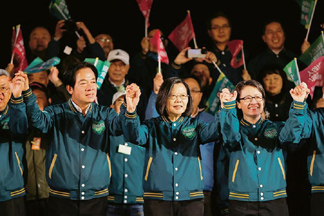WASHINGTON, D.C. (TIP): The Biden administration will send an unofficial delegation comprised of former senior officials to Taiwan shortly after the self-governed island holds an election for a new president this weekend, a move that could upset Beijing in an already-fragile bilateral relationship. A senior administration official confirmed the plan on Wednesday, January 10, without offering more details but said such a face-to-face meeting was the “most effective way” to engage the new Taiwanese government and convey US policy in the region, according to an AP report.
China and Taiwan’s opposition party Kuomintang (KMT) have warned of the danger ruling party presidential candidate Lai Ching-te can pose to peace if he wins election this weekend.
The KMT favors closer ties with China but denies being pro-Beijing. The poll is being closely watched internationally. Reuters
The official, briefing reporters on condition of anonymity to discuss sensitive plans, said the administration believed the move would contribute to peace and stability in the region. Beijing claims Taiwan to be part of Chinese territory and vows to unify with it eventually.
In August 2022, Beijing reacted angrily by firing missiles and blockading the island after then-House Speaker Nancy Pelosi visited Taiwan. Chinese President Xi Jinping, at his most recent meeting with President Joe Biden in November, called Taiwan the “most sensitive issue” in US-Chinese relations.
Washington has a security pact with Taiwan to provide it with sufficient hardware and technology to deter any armed attack from the mainland. The US has stepped up support for Taiwan and its democratically elected government in recent years as Beijing ratchets up military and diplomatic pressure on the island. The US government takes no side on the island’s statehood but insists the differences must be resolved peacefully. Biden told Xi in November that the US government opposes any unilateral change to the status quo in the Taiwan Strait.
The US has endorsed no political party or candidate in Taiwan. Beijing has made it clear that it does not want a victory by Lai Ching-te, also known as William Lai, the candidate from the ruling Democratic Progressive Party known for its pro-independence leaning.
